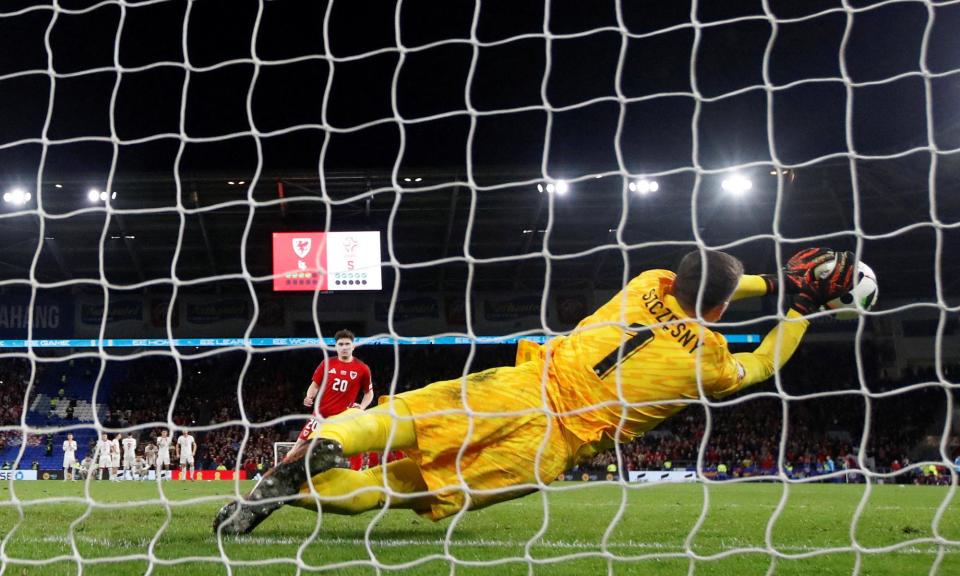Cardiff turns into a theatre of pain and leaves Wales facing an empty summer

Well, that’s something new at least. And don’t worry. It only takes about 30 years, a little bit of scar tissue, and perhaps a mournful novelty song to get over it. Poland had five shots on target all night at the Cardiff City Stadium. Unfortunately for Wales all five came in the penalty shoot out at the end of two and a half hours of relentlessly draining Euro 2024 qualifying playoff football.
In the process a first ever competitive shootout for Wales became also a first ever defeat by that most knuckle-biting of margins. It fell to Dan James to contribute the decisive miss at 5-4 down, always the worst way to lose in this self-contained theatre of pain. The kick felt wrong from the moment James lined it up. The run was too short. There is that feeling, in these moments, of a footballer suddenly cramped in their own space, the radar starting to bleep, the dials whirring, the day starting to slide the wrong way.
Related: Wales suffer Euro 2024 heartbreak after Poland win dramatic penalty shootout
Wojciech Szczesny didn’t really have to save it, just remain in the path of the ball. In that moment the air just seemed to leave the stadium, sucked out through the roof into that dark space above the lights. Suddenly the white shirts were off like a breaking wave, sprinting from the centre circle, bouncing in the goal in front of the Welsh end, like one of those experiments in how many people can be packed inside a phone box.
And so there will be no Welsh presence in Germany this summer. Not because of one scuffed shot at the death beyond the death, but because of the even goalless draw that preceded it, the slog though qualifying Group D, the struggle to fill the vast empty space left by Gareth Bale, the obvious sense of transition in a young, neat, attractive team.
Whatever the final shake-up, this was always the way it was going to end in Cardiff. This is a unique place, a giant corrugated doughnut dumped down in the middle of a low rise retail park . It really shouldn’t make this much noise. But in its most unbound moments the home support can feel like a single mass of noise, resonance, energy.
This was a different kind of spectacle. This was instead football as a kind of neurosis, an exercise in slow-burn dread right from the start. The anthem-event before kick-off had been the usual neck-bristling affair. The Polish pyro flares left a lovely glaze of mist around the eaves. At which point a very circuitous, bitty, fretful game of football broke out.
The red shapes moved among the white shapes. There were shifts of tempo, moments where things seemed to quicken, then die back just as quickly. Wales were best attacking on the flanks. Brennan Johnson and Neco Williams flickered together, creating nice patterns. For a while the home fans chanted “you’re just a shit Kieffer Moore” at Robert Lewandowski, and that was good for a bit.
Towards half-time there was a break in play while Jakub Piotrowski received some treatment and both groups of players went and huddled with their managers on the touchline, and you could almost feel the shootout optics flickering at the edges, taking shape just behind the material plane, rattling at the windows, whistling through the keyhole. Is this the promised end? Or an image of that horror? Just give it an hour and half.
Wales had the ball in the net from an offside position right on half-time. Both teams were better in the second half. Nobody stopped running. Ethan Ampadu was belligerent in central midfield. Moore chased and pressed hopefully. There were flickers. One of the biggest roars of the night was for a thudding tackle on Lewandowski by Ben Davies, one of those moments where you just get the feeling everyone needs to have a good shout.
Lewandowksi isn’t what he was. The Body is 35 years old now, with almost a thousand professional games behind him. He looks the same, still walks like a super fit bandy-legged cowboy, still carries himself like a star. He doesn’t quite have the same burst, the same whiplash pirouette, the same sense of certainty. But it was his kick that set the tone first up, rolled with chastening ease into the corner as the Red Wall tried to wave and rain-dance and magic the ball out of the net. And it is his presence on the pitch, by far the most illustrious player on either team, that should put into context Wales’s failure to qualify.
This playoff was a strange prospect all round for Robert Page, who seems to be simultaneously liked and respected but also continually imperilled. Win and he would become the first coach to take Wales to two successive tournaments. Lose and he might also lose his job. This would seem unfair on various levels. This isn’t a great Welsh team, because it has no great players, but it is a good one. Page has made a conscious effort since the World Cup to re-gear his team as younger, more athletic, more aggressively physical.
Both of these teams finished third in their qualifying groups, Poland behind Albania, Wales four points off second spot. The players gave everything here, but fell short. It still feels like a rebuild in train, albeit, on the night, a slightly painful one.

